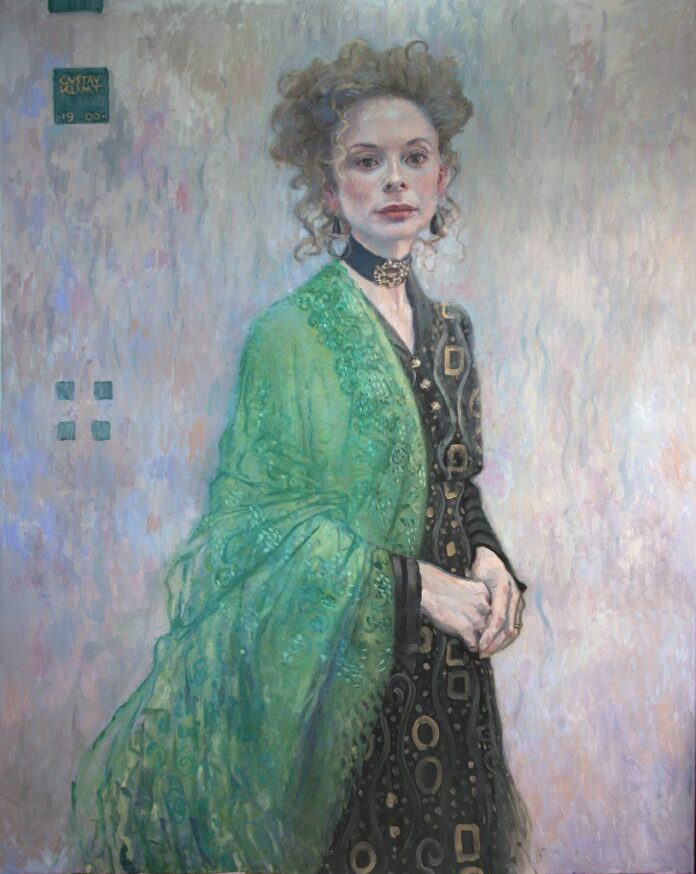Tom Stoppard’s took home the prize for best play at the 2023 Tony Awards, handed out Sunday night at the United Palace in Washington Heights. The intergenerational drama—set in Vienna between the turn of the century and 1955—prominently features a Nazi-looted portrait by Gustav Klimt.
The painting that appears on stage is actually the work of British artist Felicity Gill, a figurative painter who has shown work at Turner Contemporary in Kent, London’s Royal Academy, and the Royal Society of Portrait Painters. Previously, her most high-profile commission had been a portrait of former Prime Minister Boris Johnson during his time as mayor of London.
Gill’s ersatz Klimt depicts the character of Gretl Merz (Faye Castelow, one of only three cast members from the original West End production to make the transition to Broadway), the wife of Hermann Merz (David Krumholtz), who has converted to her Catholic faith. The two are members of an extended clan of well-off, cultured, and relatively assimilated Jews, the Merzs and the Jakobovitzs.
In the play’s opening act, set in 1899, Gretl mentions plans to sit for Klimt, a leading light of the Vienna Secession movement. But despite these trappings of wealth and sophistication, antisemitism still lurks under the surface in sophisticated Vienna, an ugly truth that will be borne out by history.
This is my #portrait of Faye Castelow in the lead role for #TomStoppard’s new play #Leopoldstadt. It now hangs as part of the set on stage at #WyndhamsTheatre. #painting #theatre #westend #london #klimt #play #stoppard pic.twitter.com/i8aZ5fTCeL
— Felicity Gill (@FelicityGill) February 17, 2020
The set, designed by Richard Hudson, becomes shabbier with the passage of time, reflecting the ghettoization of Austria’s Jews following the Anschluss. Up until the Kristallnacht, the portrait of Gretl resides in pride of place in the family’s sitting room. Its absence in the final act, a reunion of the family’s surviving members, of which there are only three, speaks volumes.
Originally titled , the painting is now the gem of Vienna’s Belvedere gallery, where it is known as .
Rose Kloster (Jenna Augen)—a child in the opening act who moved to New York before the Holocaust, but was unable to secure passage to America for the rest of her family—vows to seek the artwork’s return from the Austrian state. (This restitution effort mirrors the real-life court battle over Klimt’s famed , immortalized in the 2015 Helen Mirren film .)

A scene from featuring Eden Epstein as Hermine and Felicity Gill’s Gustav Klimt portrait. Photo by Joan Marcus.
The play’s victory on awards night was a historic one, as the fifth win in the best play category for Stoppard. The playwright, now 85, was already the record holder after wins for (1968), (1976), (1984), and (2007).
Stoppard drew on his own personal history for the production. Born Tomáš Sträussler, he was just 18 months old when his Jewish parents fled Czechoslovakia for Singapore in 1938. Like the character Leo Chamberlain (Arty Froushan)—born Leo Rosenbaum, who escaped Vienna and did not return home until 1955—Stoppard moved to England at age eight and was adopted by an Englishman, leaving him with little connection to his Jewish heritage.
The play is “autobiographical without really being an autobiographical piece,” Stoppard, who was in his 50s when he learned that all four of his grandparents were killed in the Holocaust, told the . “But elements of it are completely taken from life.”
previously won the 2020 Olivier Award for best play following its London premiere. The Broadway production, which opened last fall, closes July 2.
It also secured best director honors for Patrick Marber, best featured actor for Brandon Uranowitz, and best costume design for Brigitte Reiffenstuel. Hudson was also nominated for set design.
More Trending Stories:
Is Time Travel Real? Here Are 6 Tantalizing Pieces of Evidence From Art History

























